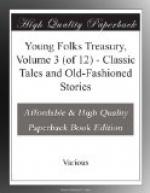The rest of the conspirators, including myself, were kept in the cage all night in bitter tears. The next morning we were taken before the magistrates. The chairman, who happened to be the very squire who had given us the seven-shilling piece, looked very severely at us, and said:
“This is the most horrible plot I ever heard of—seizing an old woman for a guy! Gentlemen,” said he to those around him, “if this be permitted none of us are safe.”
Some people used to call the magistrates old women, and so this raised a laugh.
He then called to the clerk to look over the Act of Parliament to see what could be the punishment for such an offence, but found none. Quidd was right—there was no law against seizing an old woman for a guy. The bench were puzzled what to do. At last Quidd’s father said we should be indicted for stealing his chair, and be put on our trial for robbery and sacrilege—the first for the abduction of the chair, the second for keeping the old lady from church.
Our fathers and mothers, however, pleaded so eloquently that, after a severe admonition, we got off upon payment of the costs and a handsome compensation to Dame Clackett. When I reached home my father took me into the stable and gave me a sound whipping, and at the conclusion of the flagellation said:
“Now, Peter Parley, I think you will not again seize an old woman for a guy!”
And I never did.
UNCLE DAVID’S NONSENSICAL STORY ABOUT GIANTS AND FAIRIES
By KATHERINE SINCLAIR
In the days of yore children were not all such clever, good, sensible people as they are now. Lessons were then considered rather a plague, sugar-plums were still in demand, holidays continued yet in fashion, and toys were not then made to teach mathematics, nor storybooks to give instruction in chemistry and navigation. These were very strange times, and there existed at that period a very idle, greedy, naughty boy, such as we never hear of in the present day. His father and mother were—no matter who, and he lived—no matter where. His name was Master No-book, and he seemed to think his eyes were made for nothing but to stare out of the windows, and his mouth for no other purpose but to eat. This young gentleman hated lessons like mustard, both of which brought tears into his eyes, and during school hours he sat gazing at his books, pretending to be busy, while his mind wandered away to wish impatiently for dinner, and to consider where he could get the nicest pies, pastry, ices, and jellies, while he smacked his lips at the very thoughts of them.




